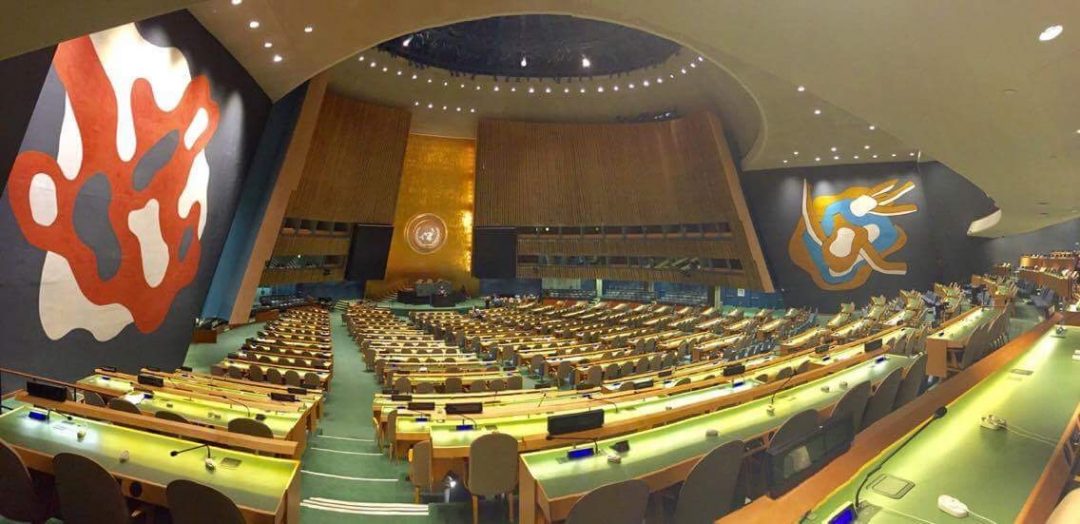Members of Peace Fellowship, EMU’s Peacebuilding & Development student organization, recently attended the Mennonite Central Committee (MCC) United Nations annual student seminar on “Migration, Faith, and Action” in New York City. This week we feature three reflections from that trip on the PXD Blog (read the first and second posts). This final post is by senior Sociology student Harrison Horst.
On Thursday afternoon, I walked into the General Assembly hall of the United Nations with the words of our morning speaker, pastor Jason Storbakken, echoing through my head. “It’s all a part of the system,” he insisted. “We’re caught up in this neoliberal, colonial empire that I think we’re called to resist.” I stood on the hall balcony, looking out on a room in which the most influential leaders in the world have met, discussed, argued, and made reverberating decisions. I also looked out on a room full of privilege, power imbalance, and historical harms – in short, a room inescapably bound to oppression and to Storbakken’s empire.
As Doug Hostetter, Director of the MCC UN office, explained, the United Nations isn’t quite as egalitarian as a casual observer may expect. While the nations represented in the UN General Assembly do technically each has one, equal vote – regardless of size or comparative economic scope – the General Assembly defers to the 15-member Security Council when it comes to issues of international peace and security. The Security Council includes ten rotating members and five permanent members, who all have decisive veto power: China, France, Russia, United Kingdom, and the United States. A single veto from any of the permanent members of the Security Council can kill any motion or resolution, even one approved by the other 14 Council members. Why isn’t Palestine included as a participating member state by the UN? Because one of the five permanent Council members – the U.S. – vetoes any resolution proposing it.
Nor should the messaging used by the UN escape without critique. During my guided tour of the UN building, I learned that the UN prizes and is represented by high levels of diversity, that “development” (what a loaded word!) is the unquestionable path forward, and that people with blue helmets mean safety, even if they’re carrying an automatic weapon. Thanks in part to MCC, I know that the story isn’t always that simple. For example, in 2010, cholera was introduced to Haiti by UN peacekeepers from Nepal, a story that MCC (and many others) worked hard to circulate.
How can we, as radical peace-loving Anabaptists, resist and respond to empire? This is the question the MCC UN office staff must ask themselves every single day, and it begs a host of other complicated questions. How can MCC, a religious non-profit development organization, be effective when placed in the context of the United Nations, in many ways the heart of global oppression? What does Christian love look like when faced with the irreconcilable realities of 193 nation-states, each with their own interests and needs?
For me, the answers lie with Storbakken’s reference to empire and, by extension, Shane Claiborne’s extensive writings on the same topic. In Jesus for President, Claiborne writes, “Over the last several years, the Christian relation to the state has become more dubious … rather than placing our hope in a transnational church that embodies God’s kingdom, we assume America is God’s hope for the world, even when it doesn’t look like Christ.” Even if they aren’t intending to adhere to Claiborne’s call, the stories I hear from the MCC UN crew – from engaging meaningfully with North Korean citizens to partnering with other religious groups to re-humanize immigration policies – are some of the best examples we have of response to empire in action.
Harrison Horst studies Sociology at Eastern Mennonite University and is a member of Peace Fellowship, EMU’s Peacebuilding & Development (PXD) student organization.
